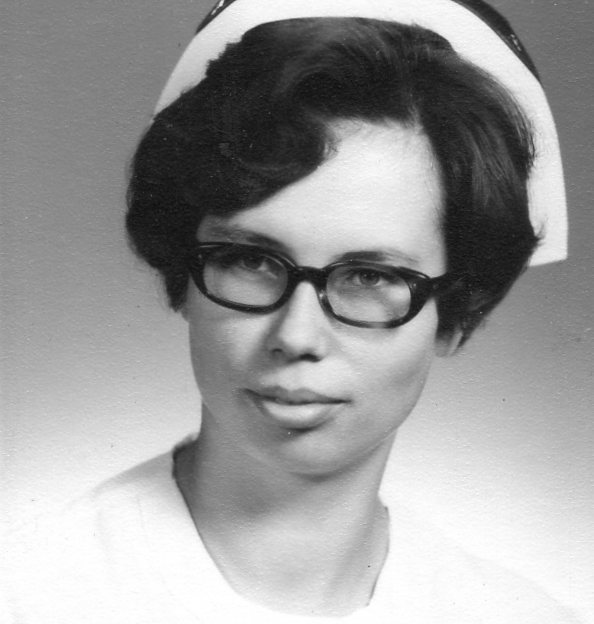Where you sit determines what you see. What you see determines what you do.
From the low rung of a ladder, her story may look like one of extreme loss, struggle and desperation. The view from down low could have led to an ending that sounded a lot like the defeat of a widow from life’s trials. But, that’s not the rung where Baerbel Merrill sits. Her vantage point seems to be a bigger, broader, higher view. One that has guided her to live her life as a funnel of gratitude. The view from her “rung” gives her the ability to rise, to use the stones that were thrown by life as a ladder not just for herself, but for others.
WHEN LOVE IS LOST
Baerbel, a German native, met her love and married him in Germany. Together, they moved to Claremont, New Hampshire in October, 1960. Being an avid fisherman, her husband planned an ice fishing trip late in November. Baerbel, 8 months pregnant with her 4th child, stayed behind with her twin 3 year olds and her 2 year old. Her husband was ice fishing in lake Champlain, Vermont’s premier fishing destination. The weekend came and went and he never returned. Baerbel called the police on Monday morning to report him missing. The officers visited her home that morning. Her 3 children were sitting at the dining table eating fried potatoes for breakfast. Groceries were low, money was low and that was all that she had available.
“When I think back now, I was impressed by the astuteness and attention of the officers. The officers must have recognized our need and without saying a word, they left and came back with 2 bags of groceries. It was the most intense validation of the goodness of the police.”
Her case was eventually passed on to the FBI since it was out of Claremont and out of state. Her husband was never found. It’s believed that he was washed out to sea by one of the many rivers that connected the lake to the Atlantic. Her love was lost.
LOVE CAN GIVE YOU THE WILL TO RISE & PEOPLE CAN GIVE YOU A LADDER
While the loss of her husband and her childrens’ dad was heavy, that was not the only pressing concern. Baerbel wasn’t yet a citizen, she didn’t speak much English, she was 8 months pregnant and didn’t work or have an income. She couldn’t afford to stay in their home. And this began her journey of ‘rising again’. Baerbel told her story as if she had been keeping record of all of the people who had helped her to rise along the way, noticed and not forgotten with each step.
The county ended up moving them to a house downtown that was more affordable. The young men that helped move her furniture were all from the county jail volunteering and fulfilling their community service needs. Once she was settled, Baerbel knew she needed to begin somewhere. Her children needed her. And so she took a step. She started to take English lessons from a retired English teacher at night. Her neighbor became her babysitter so that she could go to work from 11pm-7am. Since her husband was never found, she wasn’t technically a widow. She was forced to file for divorce. Her next step was not done alone. She received legal aide and counsel, a crucial relationship that showed back up later in life. A co-worker friend really wanted to introduce her to her nephew. Baerbel had 4 children. Baerbel thought, “He’ll run. But he didn’t run!” They dated for a number of years and got married in 1970. Each step of moving forward was supported by a new friend, someone she’d meet, or someone she’d be introduced to each step of the way.
Through the Manpower Development and Training Act, which was designed to get people out of poverty and support them with work skills, she was able to get into a 12-month LPN program. This is how she discovered her love of nursing. She was hired by a large medical center, The Mary Hitchcock Memorial Hospital. While working at this hospital, the lawyer who had worked for legal aide had kept in touch. He mentioned to Baerbel that he had a friend, a congressman from New Hampshire. He wanted to call his friend on her behalf to see if he could help her even more. One day, her supervisor at the hospital had asked her to go to Director of Nursing’s office. “My heart sank. I was thinking ‘what did I do’?” With knees knocking she entered the Director’s office. “I can’t tell this story without crying,” Baerbel says as she recounts this part of her story through tears. “You have a phone call for you from Washington DC.” She puts the phone up to her ear and they say “Please hold for the Congressman Cleveland.” That day, he gave her the news that her application for Social Security came through and she would receive 3 years of back pay.
“I remember exactly what I did with the check. Once I got the check, I bought all of my kids their own bed.” Her 3 boys had been sleeping in one bed.
Baerbel’s tearful sentiments weren’t about her loss, but about the support and help she received. Her tears were tears of gratitude. From her ‘rung of the ladder’ she was being gifted over and over and over. She recalls driving to that lawyer’s home later and met his wife and family. It was like a family reunion with the people who had done so much for her.
FROM CLIMBING THE LADDER TO BUILDING A LADDER
Baerbel didn’t stop taking steps. She got her associates degree as an RN, continued on to get her bachelors as an RN and then her Masters so that she could become a director. And if this isn’t enough “steps” in her journey of rising and climbing, she also joined the Army Reserves as a nurse. She started at the bottom and when she retired after 32 years of being in the army, she retired as a Colonel.
Baerbel moved with her family to Wyoming and worked at Campbell County hospital for 32 years and retired as Vice President of Patient Services. She also joined the National Guard after moving to Wyoming and retired at the age of 60. “I would’ve stayed longer, but they require your retirement.”
With all of the climbing, there is one special thing about Baerbel, she doesn’t climb to rise above others, she climbs and helps others to climb with her. Showing appreciation and ‘building ladders’ for the success of others became part of her core values. Her life became a funnel of the goodness and kindness she had chosen to see and receive all along the way.
At Christmas, she often sends a donation to the Claremont Police Department so that the teams of officers can continue to serve and take care of the community where she was embraced. “I want them to know they are good and appreciated.”
The other day, she was driving home and saw an elderly woman lugging her groceries on foot. She stopped to give her a ride. She ended up giving her a ride, a cup of tea and her friendship. She learned the woman didn’t have the ability to get to the library and she felt it was a “shame” for someone to not have access to the library because they couldn’t walk there. She offered to give her a ride whenever Baerbel was going in that direction and they could go together. Giving is her lifestyle. Gratitude is her position.
Giving is not always monumental in act, but it’s monumental in impact.
Even in retirement, she chooses to give and serve with the Health and Human Services for Disaster Relief. Her advice for retirees, “find something you can continue to give yourself to.”
And after all of that giving, she DID give herself a gift for retirement. A well deserved one, we might add. Next year, she and her husband, a retired elementary teacher, plan to travel on the Queen Mary cruise ship to England. They will take the train to Berlin where she grew up and also visit Vienna. “It has a 10,000 volume library, 1st rate movies with a major theater, dance halls, out of this world food and the best part is that I don’t have to make my bed!”
You deserve some days of not making your bed, Baerbel. Thank you for your example, for living a life of generosity and gratitude and for your service to our country, our communities and your neighbors. You are an inspiration, a leader of the greatest kind, and a ladder.


